Movies
Interview: Mattie Do, Laos’ First Female and Horror Director, on ‘The Long Walk’
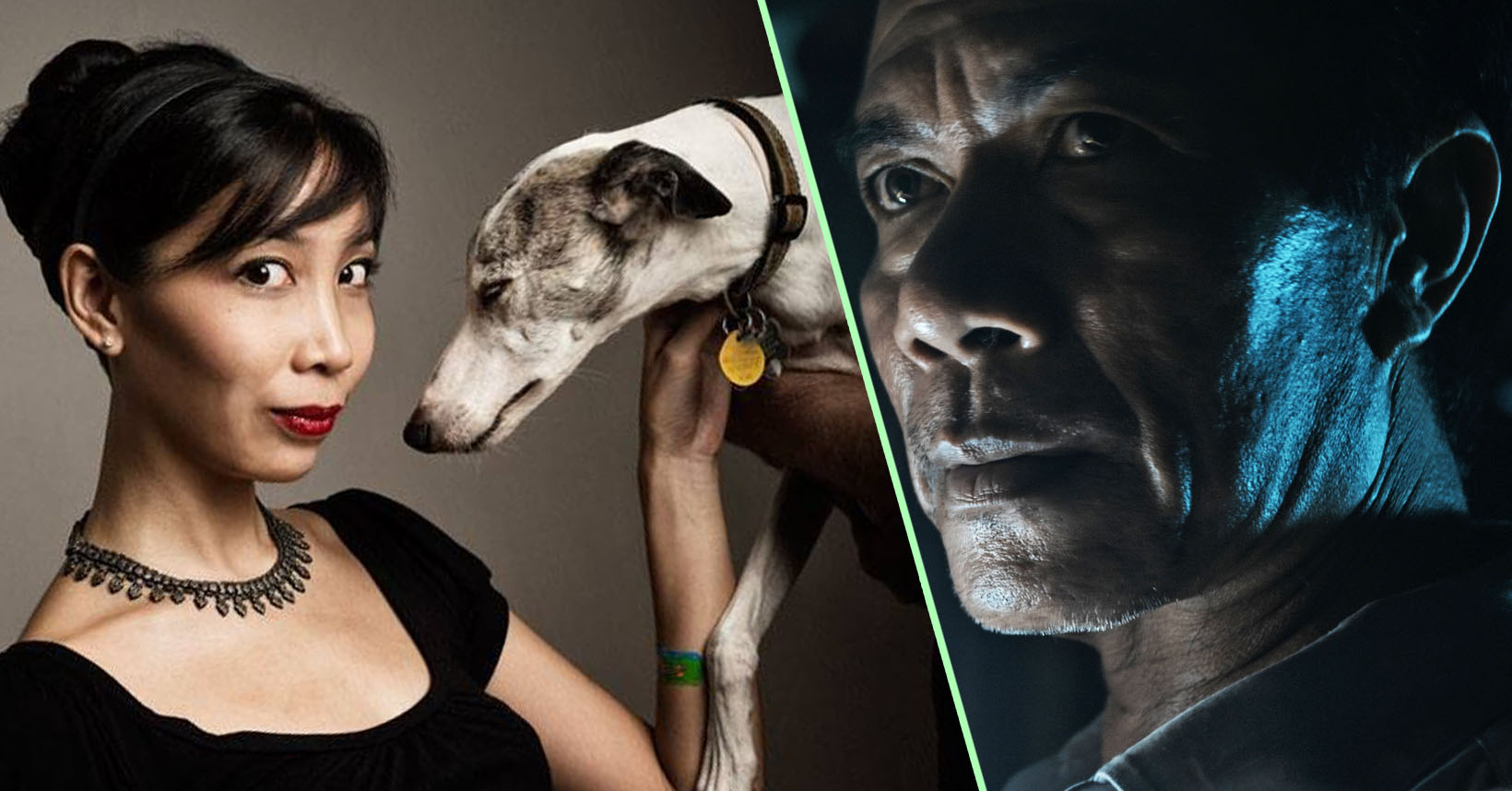
Mattie Do has been making waves in the horror genre in the last few years after blending horror elements with sci-fi and drama, and for producing films in her home country of Laos as the first and only female AND horror director. With her new film The Long Walk recently being released on VOD by Yellow Veil Pictures, we got a chance to sit down with her to discuss her latest mind-bending masterpiece of a film.
The Long Walk is a time travel drama taking place in the near future in rural Laos. A scavenger who has the ability to see ghosts finds out that he can travel back in time to the moment when he was a child where his mother was dying of tuberculosis. He tries to prevent her suffering and his younger self the trauma, but finds his actions have consequences in the future.
Director Do has been a prominent voice since her first film Chanthaly was the first Lao film to screen in well known film festivals. Her next film, Dearest Sister, premiered at the Cannes Film Festival and has since been acquired by the horror streaming site Shudder, opening it up to genre fans more broadly. We got to talk to Do about her newest film, and on poetic filmmaking, the state of the modern blockbuster, and Asian futurism.
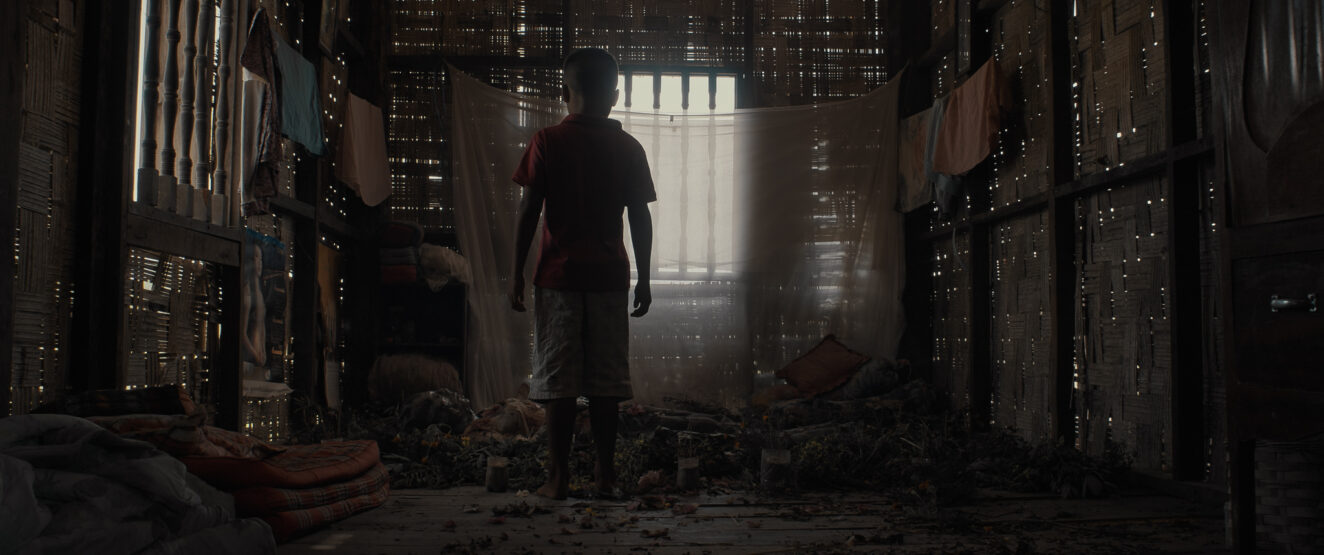
Image courtesy of Yellow Veil Pictures
Bri Spieldenner: Hey Mattie. I’m Bri from iHorror. I love your new film, and I would love to hear some insight about it from you.
Mattie Do: I always think it’s funny when people are like, what are you trying to express as a filmmaker? What would you like to express? Well, what I wanted to express is already on this screen. Otherwise I would be a poet or a novelist, you know?
BS: Yeah. But in a way, I do think that your filmmaking is a little poetic. It’s like a poem.
Mattie Do: I’m glad that people feel that way. Because poetic is an adjective that people use for many things. But poetry is an art that I think, in this modern day, was sort of unacknowledged for a long time. When was the last time you heard anything about poetry? It was at the inauguration of Biden right? With a beautiful young woman. And that made poetry cool again. And so it’s nice to be called poetic because that’s who I think of now.
BS: Already on a tangent, but I would definitely say that a lot of films have lost that emotional aspect to them. I feel like a lot of people, especially American people, don’t read as much anymore. And they’re definitely not reading poetry. So it is very fresh to see a film that is very emotional and has a lot behind the text.
Mattie Do: I think my film is hard for that general audience that you’re talking about though. I think that this is not a film for everyone. And I mean, it’s already a difficult film to categorize and everyone always tries to categorize it, because that’s how films are marketed and presented to the public, right?
A lot of Europeans still have the patience for a challenging film, but I feel like a lot of North Americans are like, oh, horror, and they assume that it’s going to be Scream, or it’s gonna be Texas Chainsaw Massacre, or some kind of jumpscare movie. Then they watch my film, which doesn’t really hold you by the hand, it expects a lot from the audience. And this is something that’s really important to me, because I believe that the audience is smart, I make the kinds of films that I make because I’m f**king tired of being treated like a baby, and being like, sat the f**k down by directors and being like, okay, let me give you the big explain now. And the character literally looks in the camera, and it’s like, let me explain everything that you’ve already seen. I don’t get how that’s happening?
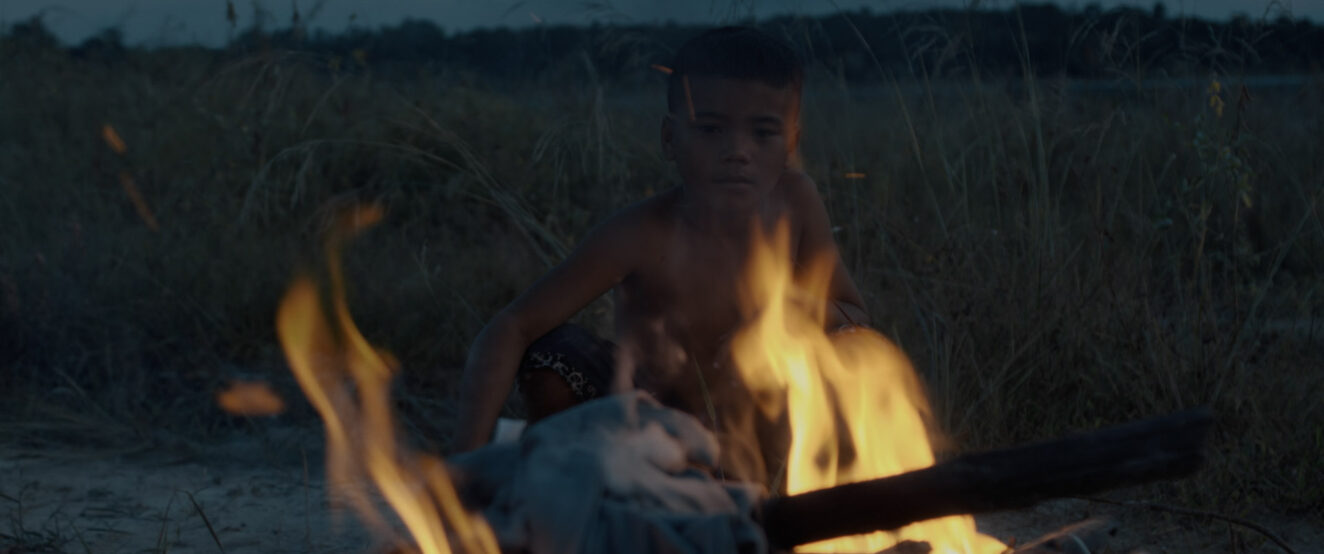
Image courtesy of Yellow Veil Pictures
“I make the kinds of films that I make because I’m f**king tired of being treated like a baby”
Or like the flashbacking, like okay, now we’re gonna have this moment and flashback flashback flashback, because they think that we’re f**king dumb, and that we need to have our hands held through the film. I got tired of that. And so I made this film and I think all my films are kind of like this, where I dole out information, and I expect the audience to connect the pieces, because the pieces are all there. Like, everything’s there. It’s just that they have to find the pieces and they have to connect the pieces. And I think that it’s fun to have this challenge.
Life happens like this film. Like where you have to figure shit out, right? You go to the office one day, and everybody’s giving you that look. They’re all staring at Bri and Bri’s like, the f**k did I do at that party on Friday? Like I said, you have to figure it out. Because nobody’s gonna flash you back.
BS: I love that explanation of it. I totally agree with you, that’s one of my least favorite things about modern filmmaking, especially American filmmaking is that it’s very much almost geared towards children. I appreciate that, like you mentioned, there are aspects of sci fi, horror, drama, you can’t really pin it to one thing. But have you ever had problems with finding an audience or marketing your films for that reason?
Mattie Do: I mean, I don’t think that my films are terribly marketable so I never thought about it in this way. These are questions for filmmakers like myself, that are difficult to answer, because I’m not making a film for a demographic. I know there are people out there for my film. And I know that there are people out there who need and want something unique and something personal and something intimate, something that isn’t easily put into a box. And that’s my audience. I can’t say that that’s my market. Because we’re probably rare creatures, not enough to sustain a huge box office Marvel hit. But why isn’t that enough?
In the business of film, people subsidize films all the time, you’ll have the popcorn crowd pleaser and then, on the side, you make this kind of film that is extremely personal that people are seeking and people are desiring and that people who are tired of general fare might want. But it’s okay, if it’s not this big giant hit, because your explosion film was a hit and and made enough money for your company to be able to finance films like this. This is my belief. But I think that the big capital Dollar Sign is so prevalent on everyone’s minds, that they forgotten that they can do business like that, too.
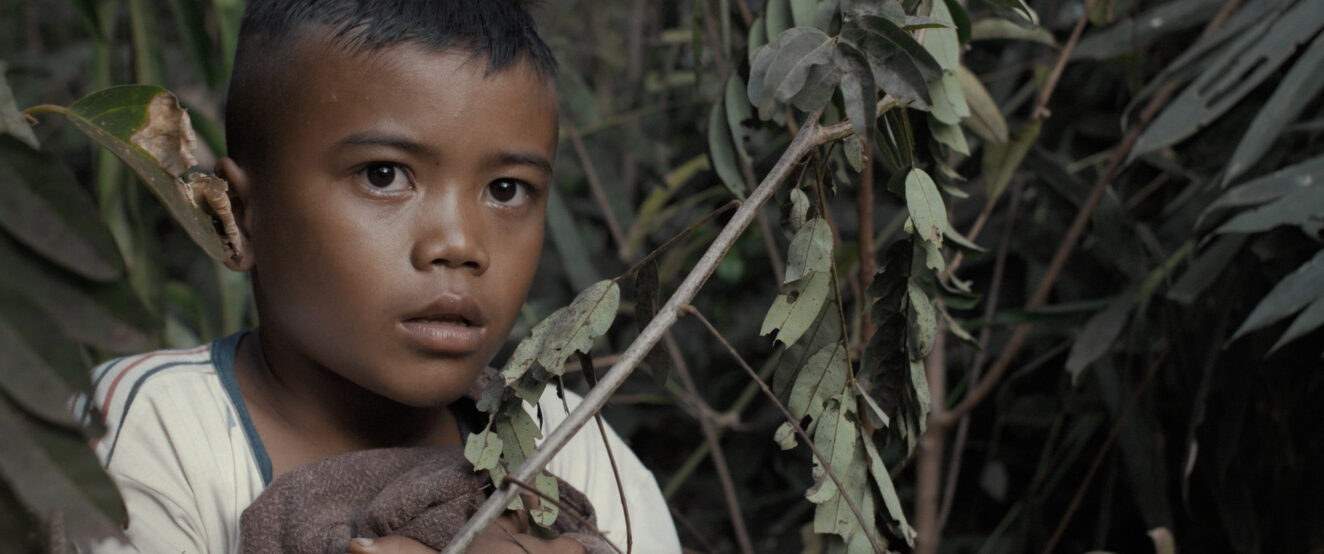
Image courtesy of Yellow Veil Pictures
BS: I totally agree with you. So let’s get to my first question. *laughs*
Mattie Do: We haven’t even gotten to the first question yet!
BS: So I noticed that there are a lot of similar themes in your films such as taking care of a sick relative. Is that based on personal experience of yours?
Mattie Do: Well, I took care of my mother when she had cancer and she was terminally ill. And I was at her side 24/7. And I held her while she died. So the effect that has on the human being is bound to ripple out into the rest of their lives. And so all of my films show characters that are flawed, and that have to deal with human trauma and with human inevitability and human consequences. Because, yes, it is very personal. And when you’ve been marked by death like that, when you’ve witnessed it, and when you felt the warmth seeping out of a human being. It’s something you never forget.
BS: I’m sorry that you’ve had that experience, but I am glad that you get to explore it in your films and I do think that it does make a mark.
Mattie Do: I think one of the themes that maybe you hadn’t explored that’s also really common in all my films. One of the most horrific themes that I always explore in my films is that the horror is not the ghost. It’s not the supernatural element. It’s not the stereotypical idea of what horror is. But the horror happens to be the humans surrounding you and happens to be society. And it happens to be humans and their lack of humanity for each other and their greed and how easily corruptible a human is and how cruel a human can be. And that’s something that I think is pervasive in a lot of my work.
BS: Yeah, for sure.
Mattie Do: I’ve never been hurt by ghosts before, Bri, but I’ve been hurt by a lot of humans.
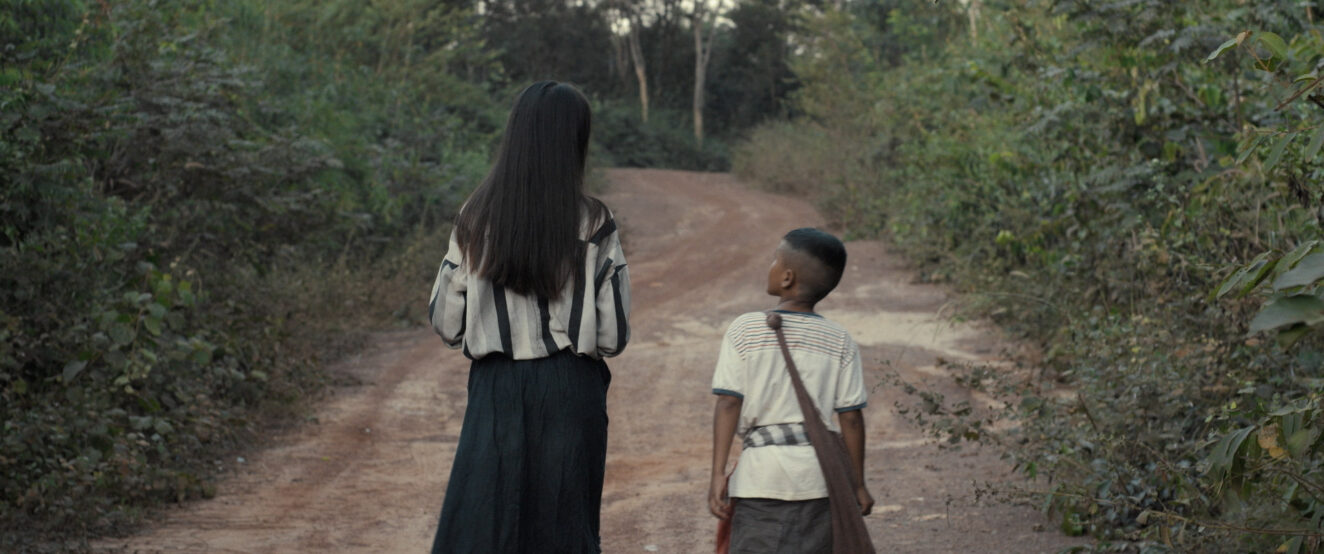
Image courtesy of Yellow Veil Pictures
“I’ve never been hurt by ghosts before, but I’ve been hurt by a lot of humans.”
BS: Very fair point. I’d have to agree with that. On that subject, what does horror look like in Laos?
Mattie Do: What’s really contradicting about Lao is they’re extremely superstitious. The majority of the population believes in ghosts, it’s an accepted thing. It’s a normal thing. So no one would tell you that you’re weird or crazy, or psycho if you felt like you saw ghosts, or you have a ghostly encounter. And sometimes it can be not a scary thing. Sometimes it can be a comforting presence that you felt the presence of an ancestral spirit or a protective spirit.
But at the same time, they’re also terrified of ghostly encounters and spirits, and curses and black magic and witchcraft. We’re an extremely folk horror driven society. A lot of people who think of folk horror they think of The Witch or The Wicker Man, or Hereditary or white people horror, but the reality is that we Asians, and we Africans and people of color have had a longer lasting population with folk horror elements, and with paganism, and animism and occult lasting for centuries and centuries before any of this modern puritanical witchcraft ever existed.
And so there’s a very strong fear of the unknown, or the older powers that be or the spiritual, but there’s also a very healthy aspect to this fear where, because it’s so accepted as real, that it’s also a part of our lives and that we can live with it.
So if horror is present, it’s real. It’s every day. But the kind of horror I think I bring on the screen isn’t just the supernatural. It’s the daily existence of life, of how you survive when people have forgotten you or left you behind. How do you survive when you’re consumed by materialism and you want to be this super rich and wealthy powerful human being or influencer or beautiful thing. It’s when we humans get corrupted, and this to me is the horror of Laos and the horror of everywhere for that matter.
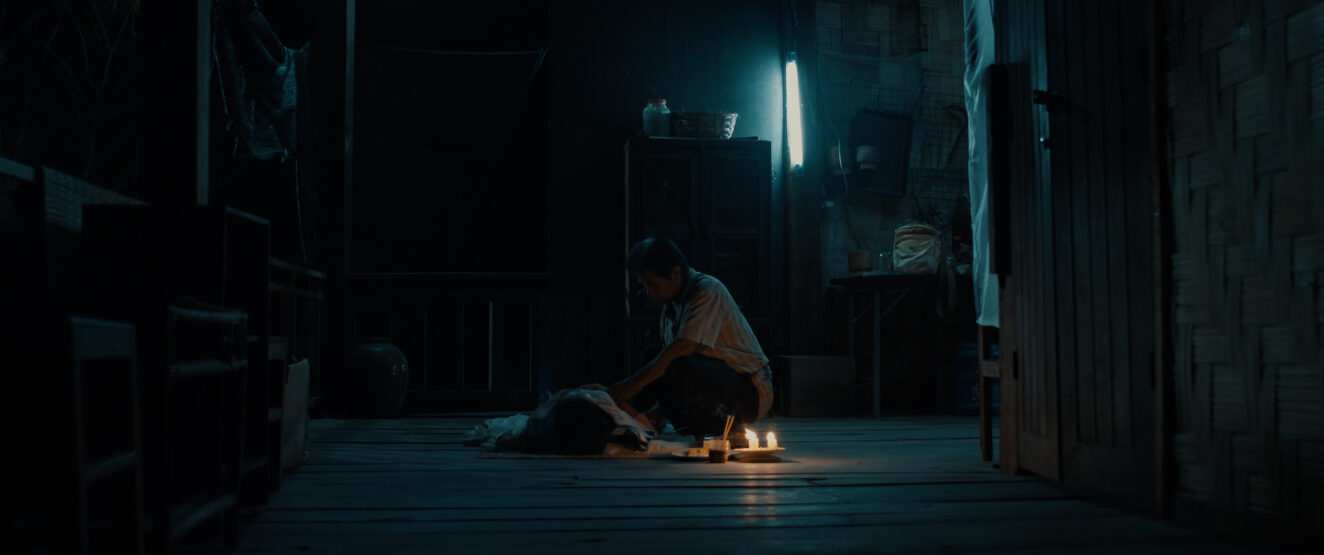
Image courtesy of Yellow Veil Pictures
“The reality is that we Asians, and we Africans and people of color have had a longer lasting population with folk horror elements, and with paganism, and animism and occult lasting for centuries and centuries before any of this modern puritanical witchcraft ever existed.”
BS: And on the subject of the horrors and the people surrounding your film. I really love how complicated a lot of the characters are, especially the lead. I was wondering what your inspiration for the characters were in The Long Walk?
Mattie Do: Actually, we’d never thought about who the inspiration for the old man was in The Long Walk. He’s just a character that is really built from what I assume all humans would feel even from myself, but I’m not a serial killer, I haven’t killed anyone or anything. But a lot of the complicated emotions that the old man goes through are similar to the emotions that I went through when I lost my dog and lost my mother. My husband is my screenwriter. And when we lost my dog, I’m sure he also went through some complex emotions as well, because we had to euthanize my dog at 17 years old.
I think it’s very human, for us to associate with the old man and to have feelings of regret and of loss. Who wouldn’t feel if they had such a terrible loss in their lives? Who wouldn’t feel like they would want to go back and try and implement a change to make it better for themselves to make it less painful. And this is what the old man is, I think he’s all of us as humans. They’re all terribly flawed, all the characters in The Long Walk. And I think that maybe I’m a little bit cynical, but most humans are flawed. I think all humans are extremely flawed in that we make bad choices.
If you’ve seen my other work Dearest Sister, it’s all about a spiraling descent of bad choices and bad choices compiling on top of each other until you’ve reached this point of no return. Of course, I take that to the extreme in all my films, but I kind of like to push people to the edge in my work. And I like to show them a scenario where if these decisions had compounded and you are forced to step over that line in the sand that’s been redrawn so many times, what could happen, and how bad can it get? And how much worse can it get?
So I wouldn’t say that there was like any one inspiration to the character, but I think that I am trying to accumulate my own feelings, as well as what I think is human feeling into him. And that’s why it’s easy to really like him, even though, when he becomes a dark, super horrible serial killer that’s killed like 20, or 30, young girls, y’all are like, oh my God, no, he’s a monster now. Don’t we love him? You’re not that man. And he says, I’m not a bad man. But the reality is, when the film opens, he’s already killed nine women. Like, this is the guy that we’re sympathizing with, this is the character that we love. And I think that that’s something that I want people to think about, too, is just because we can associate ourselves in him. Does that make him a good person?
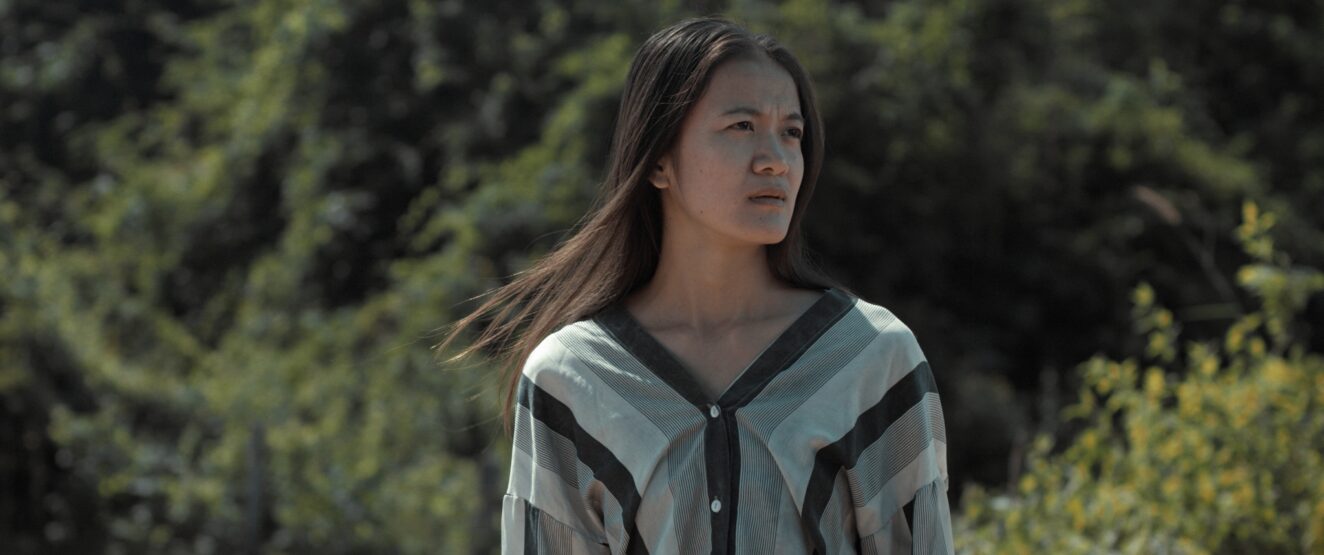
Image courtesy of Yellow Veil Pictures
BS: I have a question about the ending of the film. Since it is, in my opinion, very dark. But at the same time, it doesn’t end necessarily on a dark note. How do you see the ending of your film? Do you see it as hopelessly bleak?
Mattie Do: I think it’s ultra dark. Not hopeful at all. Really, the ending is like, ridiculously dark. One of the first words that I heard coming out of the first screening we had in Venice, from one of my crew members was, that was really bittersweet. And it’s true. It is a bittersweet ending, it’s really gorgeous, the setting is wonderful with a sunrise, the road that we’re all familiar with that we’ve all come to know, the two characters that we also have come to know and love. And the reunion that the two of them have, it seems so happy and they’re happy to see each other, you can see that they’re extremely happy to be together, but they’re trapped.
Neither of them have gotten to move on. No one in the rest of the world knows where their bodies are. So no one’s going to be able to dig them up to do the right funeral rites to let them move on according to Lao belief. And so they’re stuck in this sort of in between space, in this limbo, in this purgatory, but at least are stuck together, at least, they’re with the version of themselves that they love the most. And they can be like eternal companions in this positive state.
But the reality is that she never got to move on. That was her main goal and her main desire at all to begin with was to be able to move on and be reborn, because we’re Buddhist in Laos, and that’s what happens if you die, you get reborn until you reach Nirvana. But that doesn’t happen. It doesn’t happen for the little boy either. And she straight up says to him as an older version of himself, I don’t know where you go, and she loves them both. She loves him, but by that time, she kind of doesn’t give a f**k you know? And in her own way, she’s like, I have to move on with what’s left. And it’s a super sad and dark ending. It’s not hopeful at all, but at least they’re stranded into perpetuity together.
BS: I love that explanation from you. Yeah, it is very dark. So I love that.
Mattie Do: It’s very deceiving because when you first see her smile, she’s excited to see him and he’s so excited. He raises his hand. We didn’t subtitle that. But he basically says, “Hey! girl!” he screams “hey, lady.” And then she picks up the extra orange for him. And the sun is just gorgeous. And he’s running to her and she’s walking to him and you feel so happy. But then all of a sudden you realize what’s happened. And you’re like, dude that sucks.
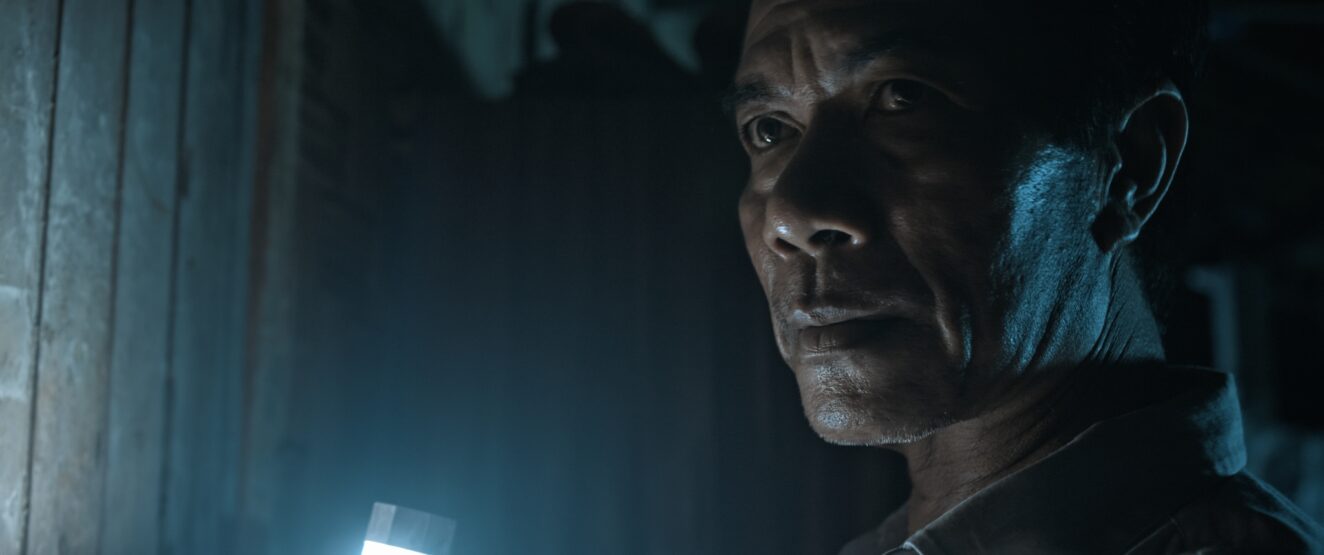
Image courtesy of Yellow Veil Pictures
BS: What did you base the futurism aspects on in the film? Where did you get this kind of future? Or why did you even choose to set it in the future?
Mattie Do: It would be easier for me to set it in the future than to set it in the past. So if I were to set the old man now in present day. And then I were to go back 50 years then I’d have to deal with costumes, the budget would be ridiculously high then I have to deal with portraying a period piece, basically. Because in Laos 50 years ago, it was a period film. I mean, even in the States 50 years ago is a period film, right? Like the cars are different. Everything’s different. So budget constraints helped a lot.
But also having it be set in the future was a huge commentary on how little the world moves, and how stagnant the world actually is, especially in a country like mine. I live in a developing country, people call it a third world country. And there’s all of these assumptions that people make about third world countries, that we have nothing that we’re like beggars, and that we’re toothless, poor, brown people who have never encountered technology before, but it’s based on reality. Like right now, you can come here and yes, there’s still dirt roads, yes, there are still villages that look like the old man’s house. And the market still looks like that. But at the same time, you can go buy vegetables from a market lady, and they’ll ask you for your QR code. And they’ll ask you to scan it with your phone. You know what I mean? And now it’s common with Venmo in the States, right?
But there was a period of time where there would be like Western tourists who would come here and we had had advancements in Asia, that were so far beyond the advancements of the Western world, that they couldn’t understand it. And they couldn’t accept it because they were also in a fresh market, with a dirt road, surrounded by people wearing traditional clothes, who spoke a language that wasn’t English. And it was like they had this mental block about no, no, no, these aren’t advancements, they’re still poor brown people, right?
And so I thought it would be fun to set something in an Asian futurism scenario, and also to show people that for as many advancements and technological progresses, we might have in 50-60 years, the human condition is still going to be present. It’s one of the things that I actually really detest about sci fi films is like, yay, we got the flying cars. We got the holographic billboards like in Blade Runner. Everything’s urban, where the f**k did the country people go? Human problems are still human problems, even if you got a flying car, who pays the bills on that flying car?
BS: I feel like the assumption is that outside of the cities, everything is destroyed by the environment personally, but that’s me insinuating.
Mattie Do: So it’s like Mad Max out there. In the metropolis you’re fine. But the food has to come from somewhere. And I guarantee you it’s not the city.
Listen to the 'Eye On Horror Podcast'
Lists
The Top-Searched Free Horror/Action Movies on Tubi This Week
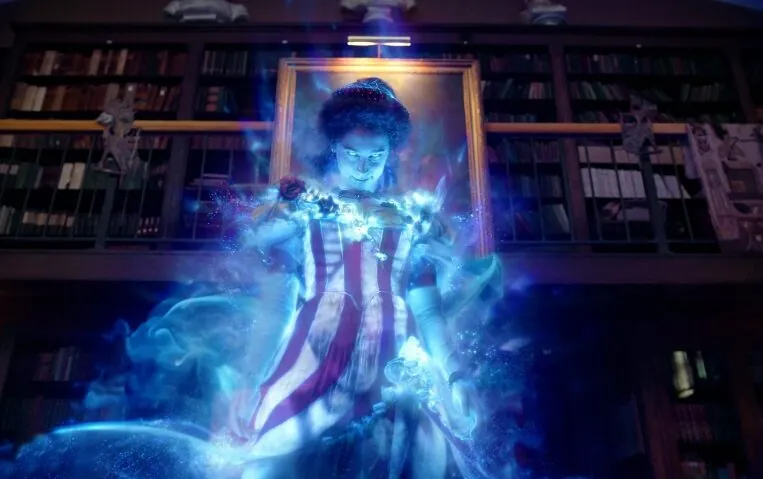
The free streaming service Tubi is a great place to scroll when you’re unsure what to watch. They are not sponsored or affiliated with iHorror. Still, we really appreciate their library because it’s so robust and has many obscure horror movies so rare you can’t find them anywhere in the wild except, if you’re lucky, in a moist cardboard box at a yard sale. Other than Tubi, where else are you going to find Nightwish (1990), Spookies (1986), or The Power (1984)?
We take a look at the most searched horror titles on the platform this week, hopefully, to save you some time in your endeavor to find something free to watch on Tubi.
Interestingly at the top of the list is one of the most polarizing sequels ever made, the female-led Ghostbusters reboot from 2016. Perhaps viewers have seen the latest sequel Frozen Empire and are curious about this franchise anomaly. They will be happy to know it’s not as bad as some think and is genuinely funny in spots.
So take a look at the list below and tell us if you are interested in any of them this weekend.
1. Ghostbusters (2016)
An otherworldly invasion of New York City assembles a pair of proton-packed paranormal enthusiasts, a nuclear engineer and a subway worker for battle.An otherworldly invasion of New York City assembles a pair of proton-packed paranormal enthusiasts, a nuclear engineer and a subway worker for battle.
2. Rampage
When a group of animals becomes vicious after a genetic experiment goes awry, a primatologist must find an antidote to avert a global catastrophe.
3. The Conjuring The Devil Made Me Do It
Paranormal investigators Ed and Lorraine Warren uncover an occult conspiracy as they help a defendant argue that a demon forced him to commit murder.
4. Terrifier 2
After being resurrected by a sinister entity, Art the Clown returns to Miles County, where his next victims, a teenage girl and her brother, await.
5. Don’t Breathe
A group of teens breaks into a blind man’s home, thinking they’ll get away with the perfect crime but get more than they bargained for once inside.
6. The Conjuring 2
In one of their most terrifying paranormal investigations, Lorraine and Ed Warren help a single mother of four in a house plagued by sinister spirits.
7. Child’s Play (1988)
A dying serial killer uses voodoo to transfer his soul into a Chucky doll which winds up in the hands of a boy who may be the doll’s next victim.
8. Jeepers Creepers 2
When their bus breaks down on a deserted road, a team of high school athletes discovers an opponent they cannot defeat and may not survive.
9. Jeepers Creepers
After making a horrific discovery in the basement of an old church, a pair of siblings find themselves the chosen prey of an indestructible force.
Listen to the 'Eye On Horror Podcast'
Movie Reviews
Panic Fest 2024 Review: ‘Haunted Ulster Live’
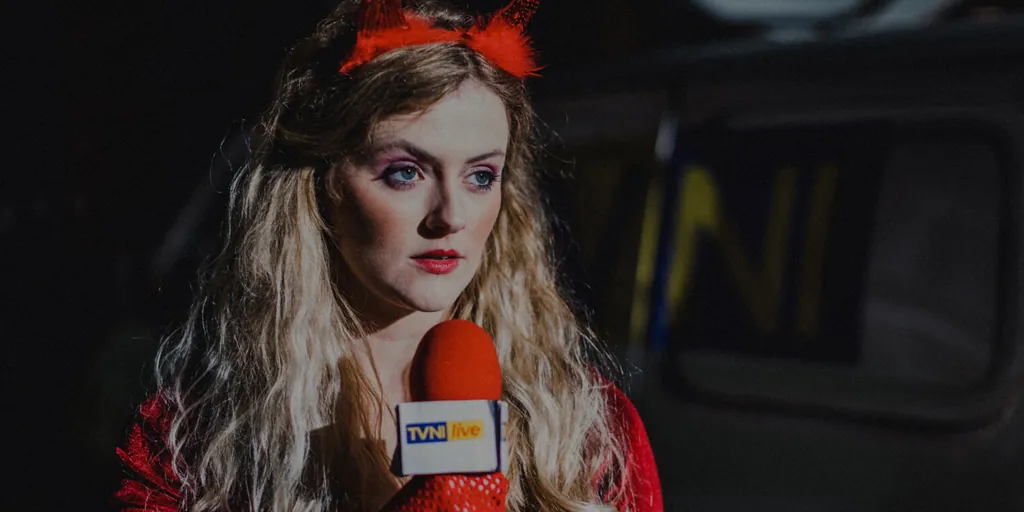
Everything old is new again.
On Halloween 1998, the local news of Northern Ireland decide to do a special live report from an allegedly haunted house in Belfast. Hosted by local personality Gerry Burns (Mark Claney) and popular children’s presenter Michelle Kelly (Aimee Richardson) they intend to look at the supernatural forces disturbing the current family living there. With legends and folklore abound, is there an actual spirit curse in the building or something far more insidious at work?
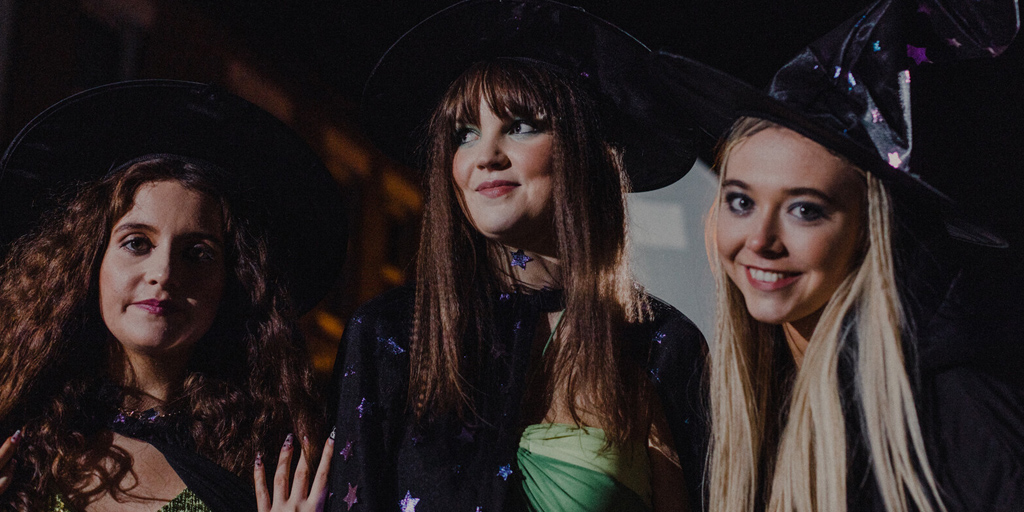
Presented as a series of found footage from a long forgotten broadcast, Haunted Ulster Live follows similar formats and premises as Ghostwatch and The WNUF Halloween Special with a news crew investigating the supernatural for big ratings only to get in over their heads. And while the plot has certainly been done before, director Dominic O’Neill’s 90’s set tale of local access horror manages to stand out on its own ghastly feet. The dynamic between Gerry and Michelle is most prominent, with him being an experienced broadcaster who thinks this production is beneath him and Michelle being fresh blood who is considerably annoyed at being presented as costumed eye candy. This builds as the events within and around the domicile becomes too much to ignore as anything less than the real deal.
The cast of characters is rounded out by the McKillen family who have been dealing with the haunting for some time and how it’s had an effect on them. Experts are brought in to help explain the situation including the paranormal investigator Robert (Dave Fleming) and the psychic Sarah (Antoinette Morelli) who bring their own perspectives and angles to the haunting. A long and colorful history is established about the house, with Robert discussing how it used to be the site of an ancient ceremonial stone, the center of leylines, and how it was possibly possessed by the ghost of a former owner named Mr. Newell. And local legends abound about a nefarious spirit named Blackfoot Jack that would leave trails of dark footprints in his wake. It’s a fun twist having multiple potential explanations for the site’s strange occurrences instead of one end-all be-all source. Especially as the events unfold and the investigators try to discover the truth.
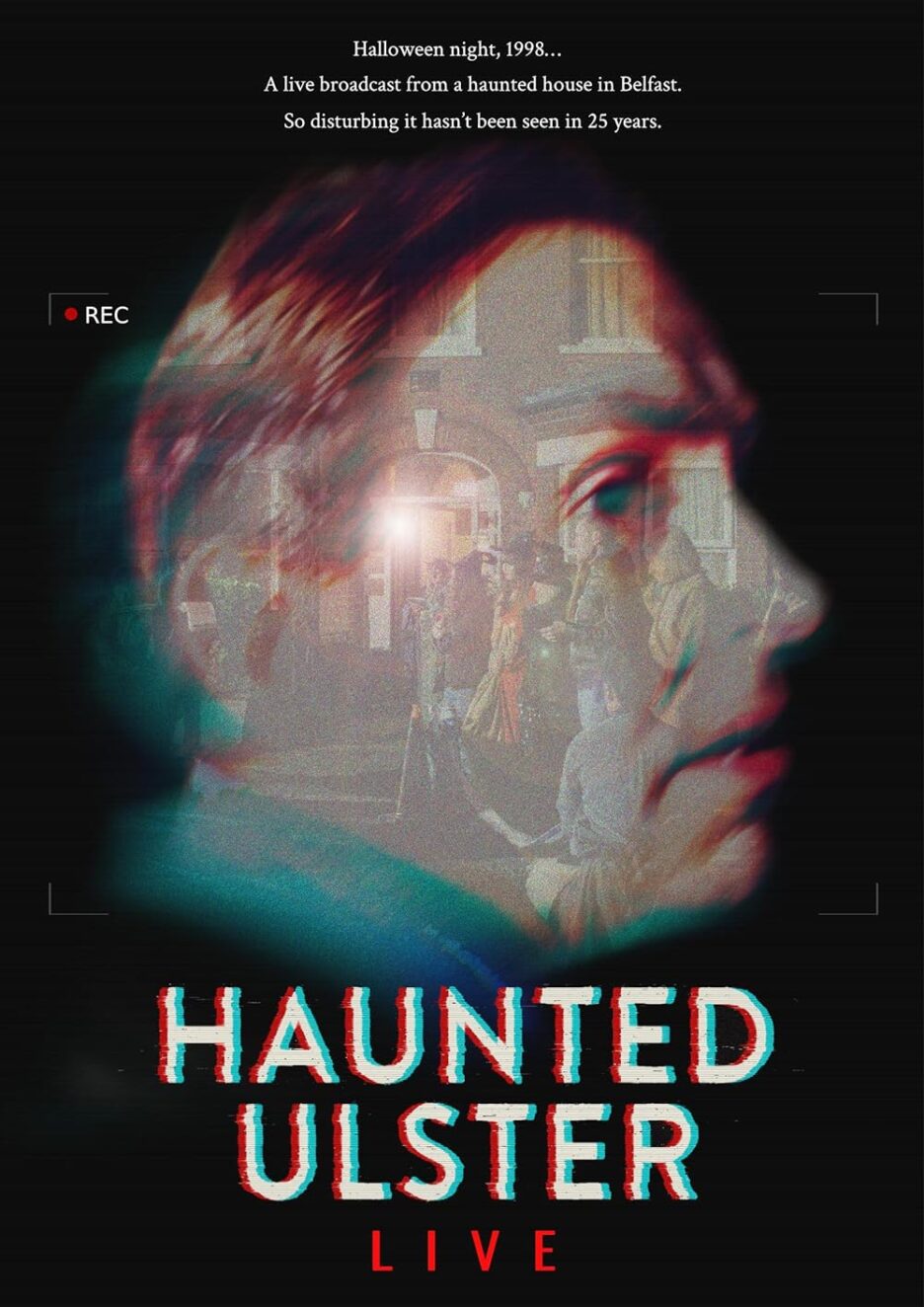
At its 79 minute timelength, and the encompassing broadcast, it’s a bit of a slow burn as the characters and lore is established. Between some news interruptions and behind the scenes footage, the action is mostly focused on Gerry and Michelle and the build up to their actual encounters with forces beyond their comprehension. I will give kudos that it went places I didn’t expect, leading to a surprisingly poignant and spiritually horrifying third act.
So, while Haunted Ulster Live isn’t exactly trendsetting, it definitely follows in the footsteps of similar found footage and broadcast horror films to walk its own path. Making for an entertaining and compact piece of mockumentary. If you’re a fan of the sub-genres, Haunted Ulster Live is well worth a watch.

Listen to the 'Eye On Horror Podcast'
Movie Reviews
Panic Fest 2024 Review: ‘Never Hike Alone 2’
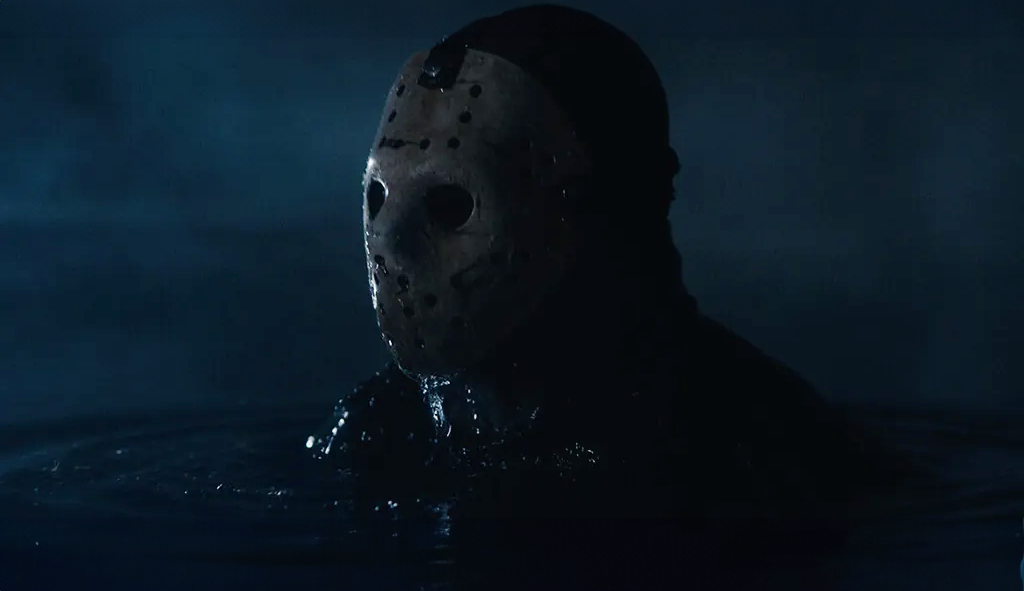
There are fewer icons more recognizable than the slasher. Freddy Krueger. Michael Myers. Victor Crowley. Notorious killers who always seem to come back for more no matter how many times they are slain or their franchises seemingly put to a final chapter or nightmare. And so it seems that even some legal disputes cannot stop one of the most memorable movie murderers of all: Jason Voorhees!
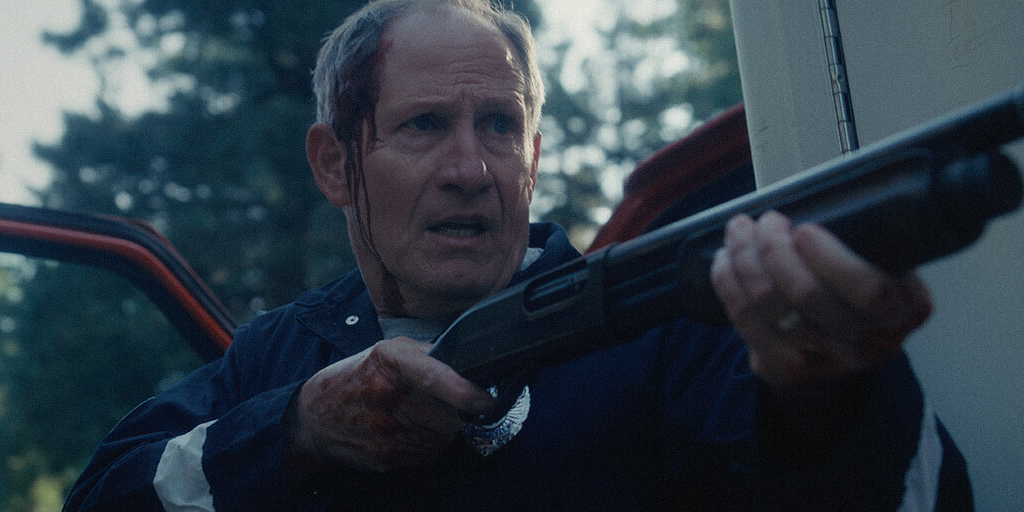
Following the events of the first Never Hike Alone, outdoorsman and YouTuber Kyle McLeod (Drew Leighty) has been hospitalized after his encounter with the long thought dead Jason Voorhees, saved by perhaps the hockey masked killer’s greatest adversary Tommy Jarvis (Thom Mathews) who now currently works as an EMT around Crystal Lake. Still haunted by Jason, Tommy Jarvis struggles to find a sense of stability and this latest encounter is pushing him to end the reign of Voorhees once and for all…
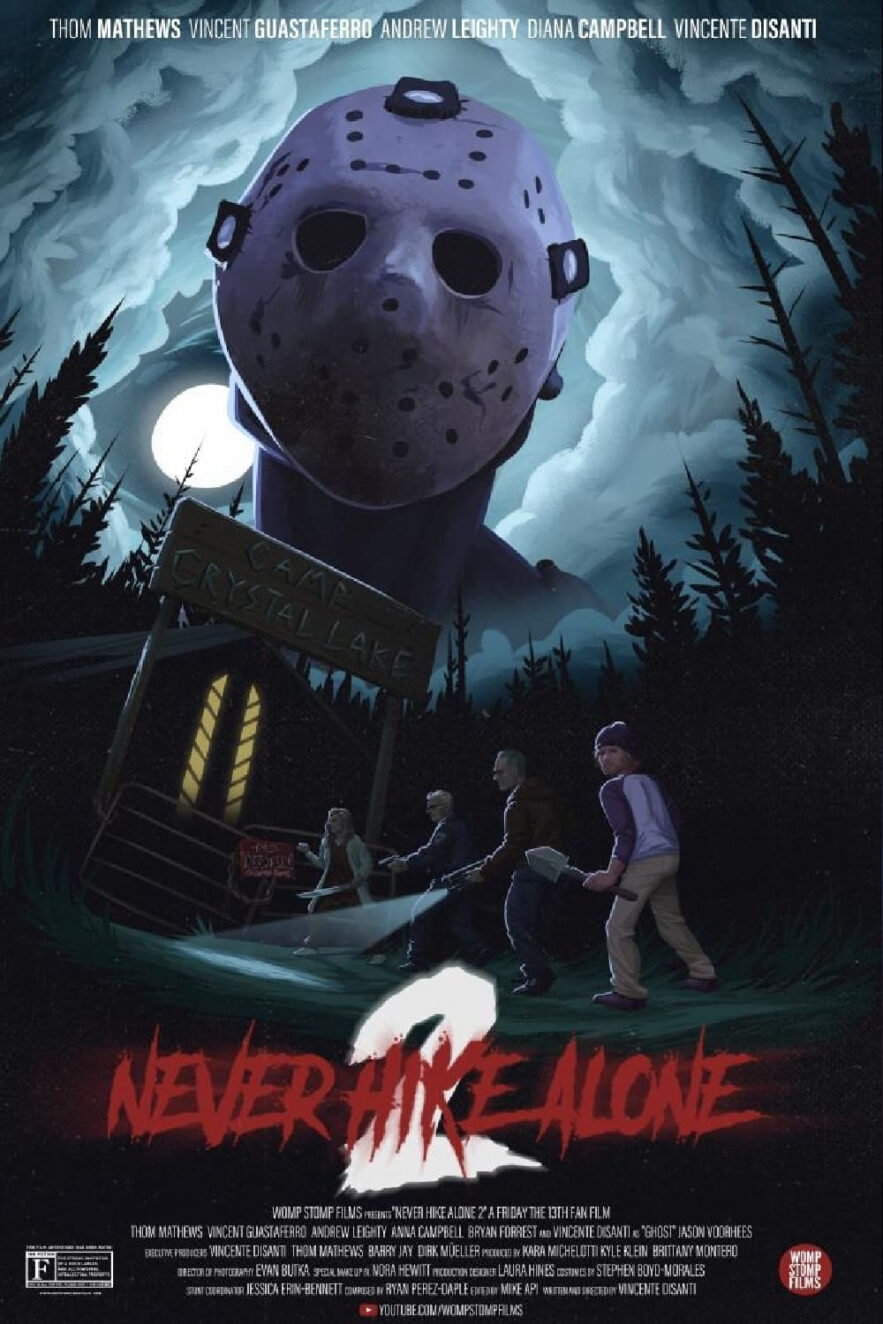
Never Hike Alone made a splash online as a well shot and thoughtful fan film continuation of the classic slasher franchise that was built up with the snowbound follow up Never Hike In The Snow and now climaxing with this direct sequel. It’s not only an incredible Friday The 13th love letter, but a well thought out and entertaining epilogue of sorts to the infamous ‘Tommy Jarvis Trilogy’ from within the franchise that encapsulated Friday The 13th Part IV: The Final Chapter, Friday The 13th Part V: A New Beginning, and Friday The 13th Part VI: Jason Lives. Even getting some of the original cast back as their characters to continue the tale! Thom Mathews being the most prominent as Tommy Jarvis, but with other series casting like Vincent Guastaferro returning as now Sheriff Rick Cologne and still having a bone to pick with Jarvis and the mess around Jason Voorhees. Even featuring some Friday The 13th alumni like Part III‘s Larry Zerner as the mayor of Crystal Lake!
On top of that, the movie delivers on kills and action. Taking turns that some of the previous fils never got the chance to deliver on. Most prominently, Jason Voorhees going on a rampage through Crystal Lake proper when he slices his way through a hospital! Creating a nice throughline of the mythology of Friday The 13th, Tommy Jarvis and the cast’s trauma, and Jason doing what he does best in the most cinematically gory ways possible.
The Never Hike Alone films from Womp Stomp Films and Vincente DiSanti are a testament to the fanbase of Friday The 13th and the still enduring popularity of those films and of Jason Voorhees. And while officially, no new movie in the franchise is on the horizon for the foreseeable future, at the very least there is some comfort knowing fans are willing to go to these lengths to fill the void.

Listen to the 'Eye On Horror Podcast'
-
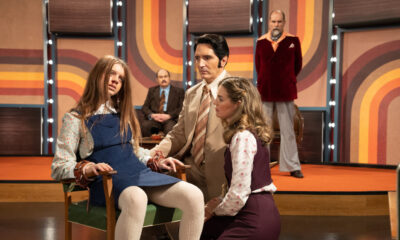
 Movies5 days ago
Movies5 days ago‘Late Night With the Devil’ Brings The Fire to Streaming
-
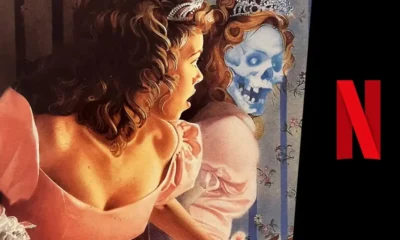
 News4 days ago
News4 days agoNetflix Releases First BTS ‘Fear Street: Prom Queen’ Footage
-

 News2 days ago
News2 days ago“Mickey Vs. Winnie”: Iconic Childhood Characters Collide In A Terrifying Versus Slasher
-
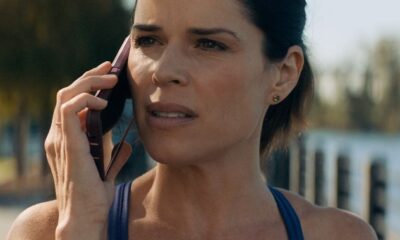
 Movies5 days ago
Movies5 days agoWill ‘Scream VII’ Focus on The Prescott Family, Kids?
-
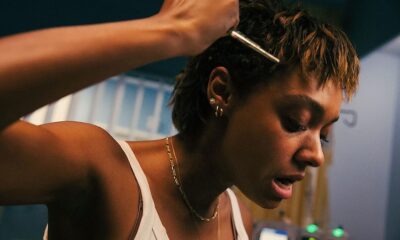
 News4 days ago
News4 days ago‘Talk To Me’ Directors Danny & Michael Philippou Reteam With A24 for ‘Bring Her Back’
-
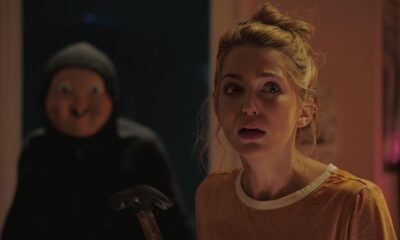
 News4 days ago
News4 days ago‘Happy Death Day 3’ Only Needs Greenlight From Studio
-
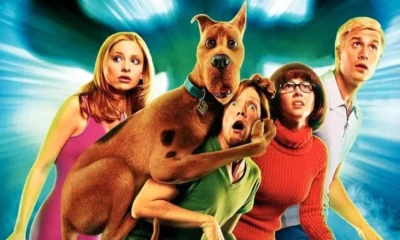
 News4 days ago
News4 days agoLive Action Scooby-Doo Reboot Series In Works at Netflix
-
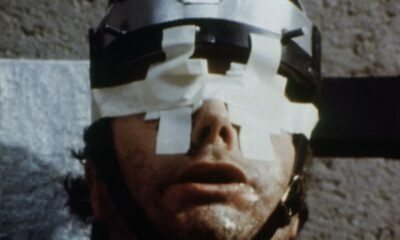
 News2 days ago
News2 days agoNew ‘Faces of Death’ Remake Will Be Rated R For “Strong Bloody Violence and Gore”
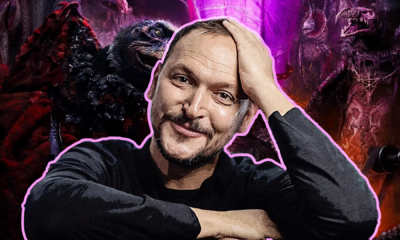

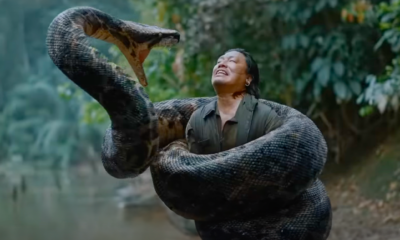

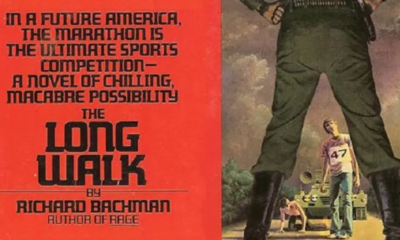


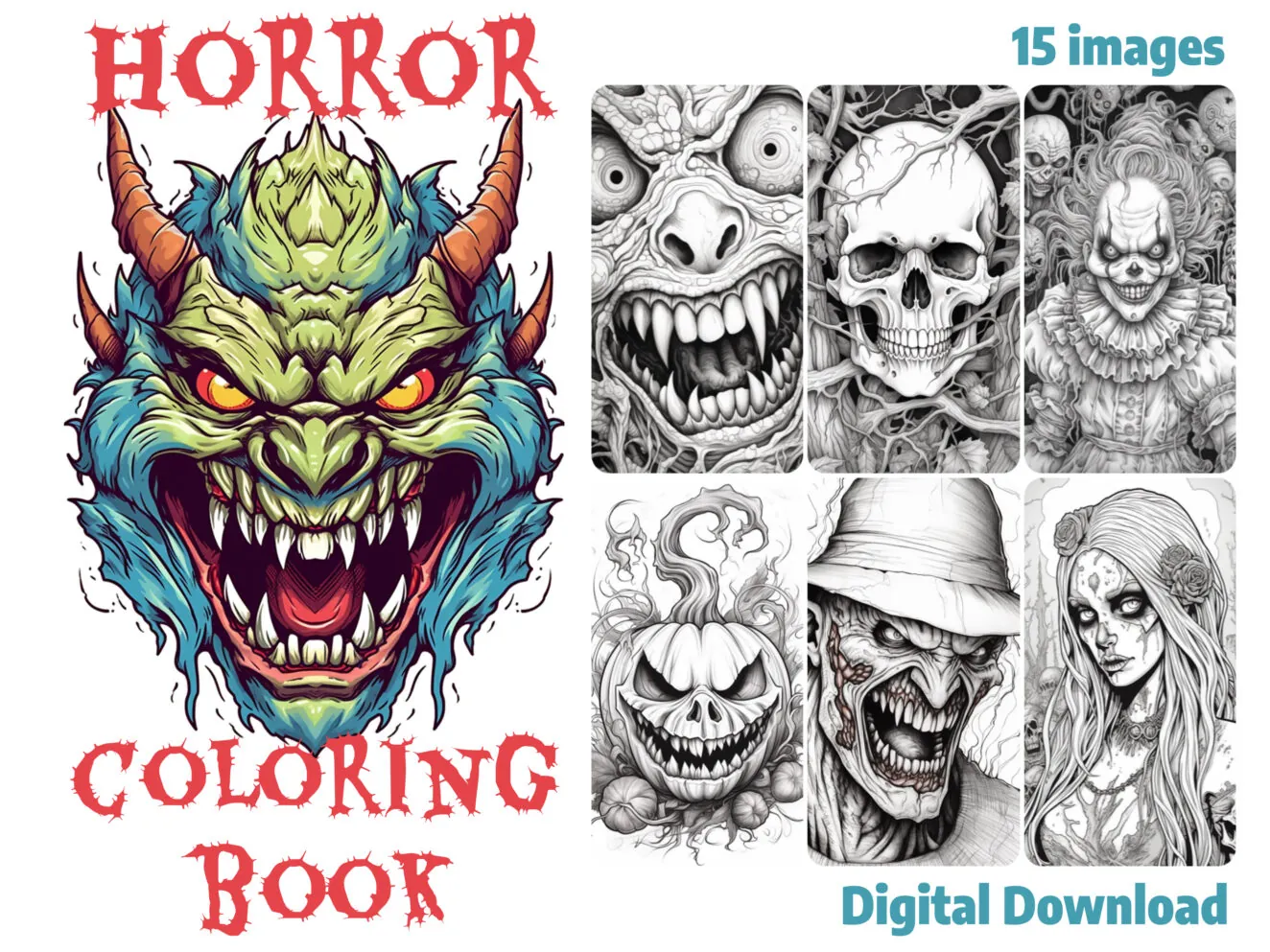
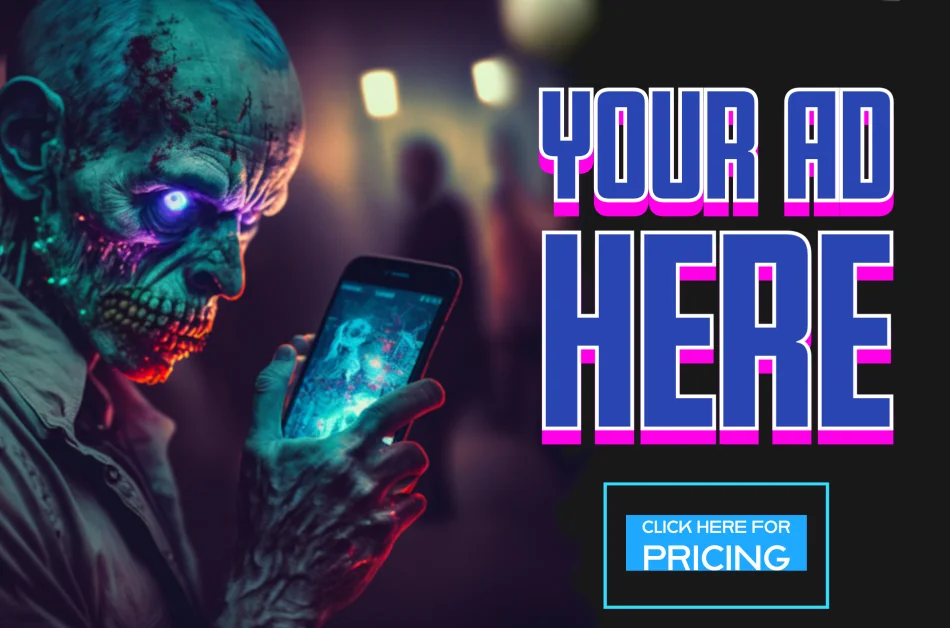




















You must be logged in to post a comment Login